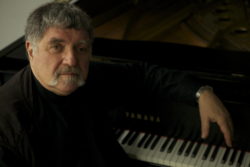Your cart is currently empty!

Music lessons learned #2

Class, remember, whatever you play, be real!
The words sounded into the room and hit me like a truck. Tuba player Bob Stewart was the making the statement. We were in my ensemble class at the Jazz Program at the New School, New York, which I attended for a Master of Fine Arts back in 1988-89. As I recall, Stewart was subbing for my regular ensemble teacher trumpet player Lester Bowie (1941-1999). The class had played yet another free music improvisation. Often, when playing music in an improvised manner, as the music is about to end a zone of, in my experience, heightened awareness appears. Everybody is trying to figure out not how to stop but where the music, by itself, wants to end. Looking for the moment where it all folds back into silence, and everyone feels that this particular note was the last one.
Just at that precise moment, Stewart – handsome, well-dressed and carrying himself with both pride and authenticity – sitting with his tuba in his lab in the middle of the room spoke the sentence above. I recall the moment very clearly today some 30 years later.
Now the question is, why do I remember this moment so vividly?
I intuitively knew what he meant. I also had experienced various moments in various situations where I had played something because I believed it to be hip or cool. And with the purpose to impress or convince someone of my knowledge or skills and guaranteed to feel awkward and inauthentic doing it. His statement, I’m sure, let to a quick moment of self-examination: had I played something, that was not ‘real’? As I remember it, I concluded that I had done OK.
So what is this thing about being ‘real’ in the context of musical activities within the field of jazz?
Music is a language of emotions, and on a practical level, we learn it the same way as we learn the spoken word. By imitation, repetition, and trying out things. Investigating the meaning of words and phrases in various contexts to observe their effect on situations and others. What reaction is coming back at me, when throwing out a particular combination of words in a specific setting?
Music learning functions in much the same manner when picking up songs, melodies, intervals, rhythms, phrasing, etc., all which later reappears in our musical language in bits and fragments. The point is that they now appear recontextualized and altered to fit into new contexts and surroundings, just like the spoken language.
If someone in a spoken conversation starts saying things, that doesn’t communicate own personal experiences or feelings; you feel the inauthenticity. It feels like one is pretending or fake, one is the opposite of real. The same way it functions within music playing, which is all about going inside ourself and uncover what you are experiencing and communicating that.
The same way if you intend a free and spontaneous conversation with someone allowed to lead to any place. It is sometimes all to clear if your conversation partner has a clear underlying agenda of where this conversation is leading and what its limits are. It feels restrictive and blocks out interesting detours and free imagination. Improvised music is also subject to this type of logic. If someone manifests themselves too eagerly, you miss out on all the more surprising and unexpected places that the music itself were planning to take you.
As my teacher in jazz theory, Hal Galper, put it: You have to be exciting, not excited!. He said it when reprimanding me at our very first musical playing encounter at the school.

That statement hit me equally hard as Stewart’s – and is remembered as vividly – because, at a deeper level, I understood their messages. It is not about you, but the music. You are not the driver, but the passenger. And at the same time, it is all about you. The real you.
So, finally, what am I getting at with all this?
I learned a lot of practical musical knowledge at the New School, which I probably would have learned anyway or elsewhere. But the profound statements you get from senior master practitioners into music as – in my opinion – a spiritual practice at the right moments can affect the way you approach music the rest of your life.
I know that both Bob Stewart and Hal Galper (and more) helped me tremendously in finding myself and my way within the music.
I thank you, both!
PS. My experiences in New York also manifested themselves on the album release What I Miss. That story you will find here.